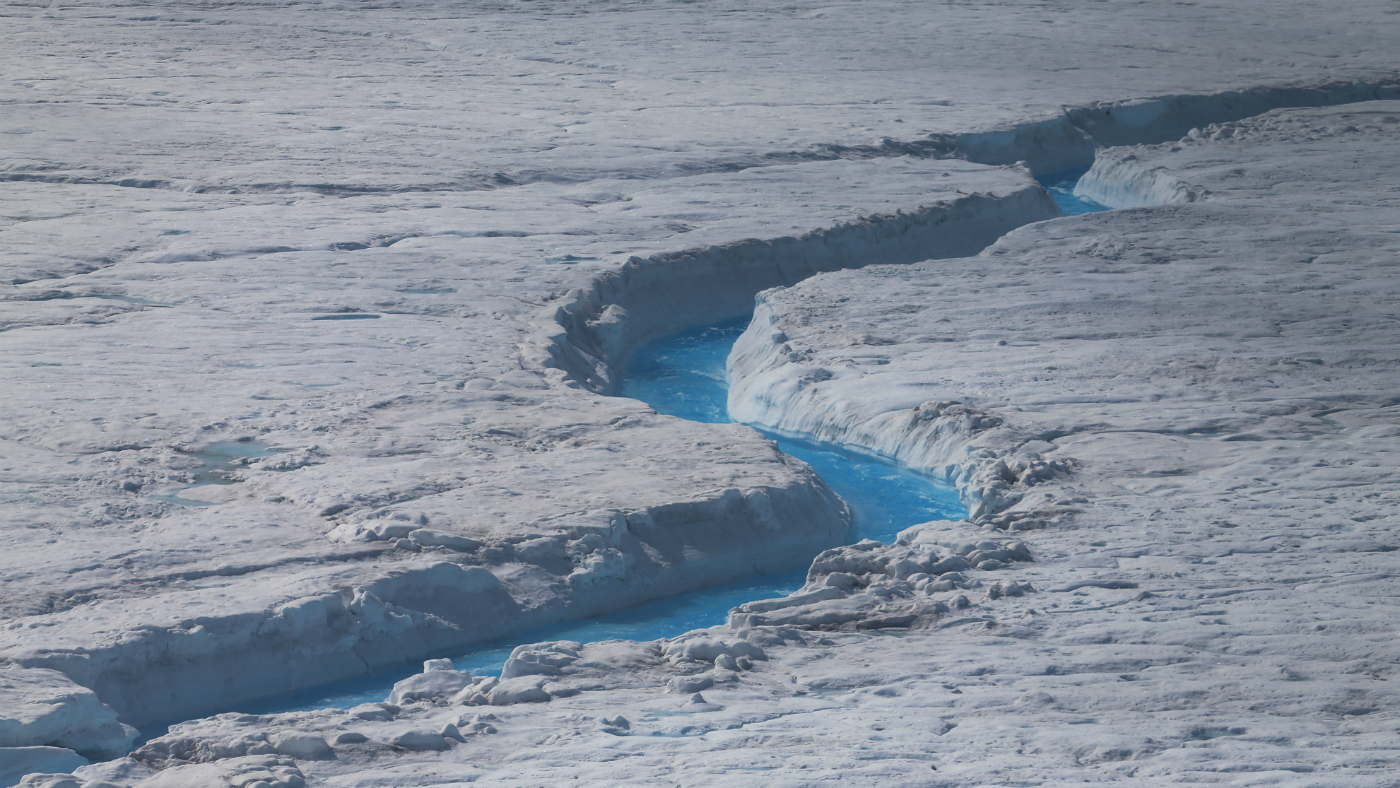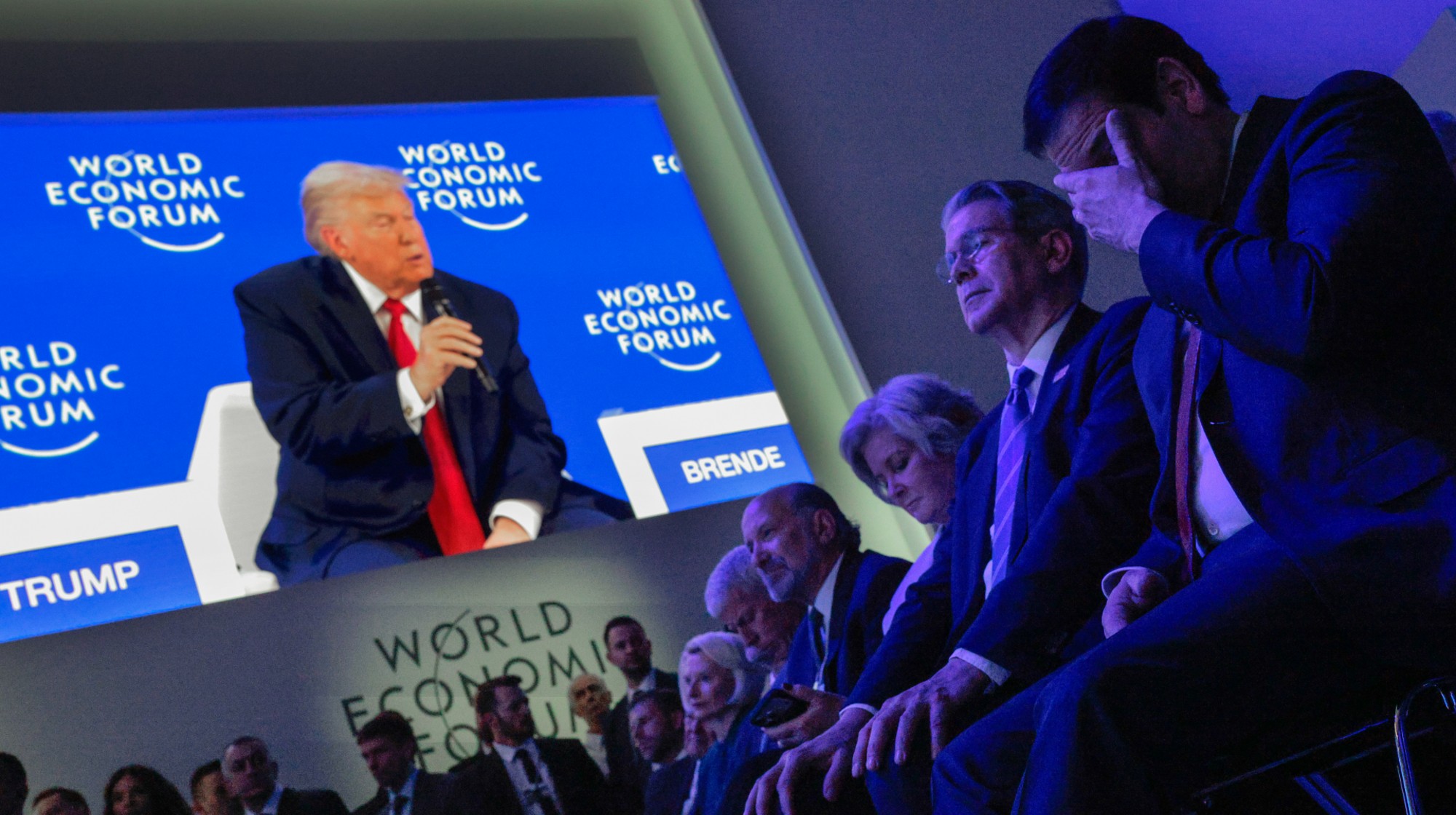What the breakaway Spalte glacier tells us about climate change
Scientists warn that calving of largest remaining Arctic ice shelf could be ‘major centre of action for the deglaciation of Greenland’

A free daily email with the biggest news stories of the day – and the best features from TheWeek.com
You are now subscribed
Your newsletter sign-up was successful
A segment of the largest ice shelf in the Artic has broken off and shattered into small pieces, with scientists claiming the incident is further evidence of climate change’s effect on the region.
This week, the 42 square mile Spalte Glacier in northern Greenland separated from the Nioghalvfjerdsfjorden ice shelf in a dramatic calving event, with satellite images revealing that the glacier has since become a “flotilla of icebergs”, BBC News reports.
Researchers believe the loss of the ice chunk is a direct result of rapid climate change taking place in the Arctic around Greenland.
The Week
Escape your echo chamber. Get the facts behind the news, plus analysis from multiple perspectives.

Sign up for The Week's Free Newsletters
From our morning news briefing to a weekly Good News Newsletter, get the best of The Week delivered directly to your inbox.
From our morning news briefing to a weekly Good News Newsletter, get the best of The Week delivered directly to your inbox.
Speaking to the BBC, Dr Jenny Turton said: “The atmosphere in this region has warmed by about 3C since 1980... And in 2019 and 2020, it saw record summer temperatures.”
So what has happened in Greenland and what does it say about climate change?
What is the Nioghalvfjerdsfjorden ice shelf?
Also known as 79N, the Nioghalvfjerdsfjorden ice shelf is one of the largest in the world at around 80km long by 20km wide and plays an important role in regulating the Arctic climate around Greenland.
A free daily email with the biggest news stories of the day – and the best features from TheWeek.com
According to a 2018 paper published in the journal Nature, the shelf - together with its neighbours Zachariæ Isstrom and Storstrommen - is one of the major outlets of the North East Greenland Ice Stream (NEGIS), a 600-km-long ice stream that drains around 15% of the interior Greenland ice sheet into the ocean.
However, while the ice shelf was thought to be relatively stable, “increased thinning rates” seen on the shelf since 2006 are “likely related to increased air temperatures leading to higher melt rates and a reduction in summer sea ice concentration”, which “facilitates higher calving and retreat rates”.
What happened this week?
The BBC reports that at its leading edge, the 79N ice shelf split in two, with a “minor offshoot turning directly north” known as the Spalte Glacier.
After enduring high summer temperatures last year and fracturing heavily as a result, it fully broke off from the remainder of the ice shelf this week, fragmenting into thousands of small icebergs.
What does this say about climate change?
“Look closely at the satellite pictures and the higher air temperatures recorded in the region are obvious from the large number of melt ponds that sit on top of the shelf ice,” the BBC reports, adding that the presence of such pools of water is often problematic for ice platforms as they push down through the ice and weaken it structurally.
The broadcaster adds that oceanographers believe the ice sheet is “being attacked from above and below” after also documenting warmer sea temperatures, meaning the shelf ice is almost certainly being melted from beneath.
The paper published in Nature says the ice shelves that make up the NEGIS region, if lost, have the potential to see global sea levels rise by 1.1m.
And this week’s event is far from the only damning piece of evidence that climate change is adversely affecting Greenland.
In a 2015 study, scientists from the Danish Meteorological Institute analysed data from 11 stations around Greenland and found that all stations showed a positive correlation between warmer summers and an increased rate of ice sheet loss.
“79N became ‘the largest remaining Arctic ice shelf’ only fairly recently, after the Petermann Glacier in northwest Greenland lost a lot of area in 2010 and 2012,” Professor Jason Box of the Geological Survey of Denmark and Greenland (GEUS) told the BBC this week.
“What makes 79N so important is the way it’s attached to the interior ice sheet, and that means that one day - if the climate warms as we expect - this region will probably become one of the major centres of action for the deglaciation of Greenland.”
-
 How the FCC’s ‘equal time’ rule works
How the FCC’s ‘equal time’ rule worksIn the Spotlight The law is at the heart of the Colbert-CBS conflict
-
 What is the endgame in the DHS shutdown?
What is the endgame in the DHS shutdown?Today’s Big Question Democrats want to rein in ICE’s immigration crackdown
-
 ‘Poor time management isn’t just an inconvenience’
‘Poor time management isn’t just an inconvenience’Instant Opinion Opinion, comment and editorials of the day
-
 Greenland’s capital becomes ground zero for the country’s diplomatic straits
Greenland’s capital becomes ground zero for the country’s diplomatic straitsIN THE SPOTLIGHT A flurry of new consular activity in Nuuk shows how important Greenland has become to Europeans’ anxiety about American imperialism
-
 Epstein files topple law CEO, roil UK government
Epstein files topple law CEO, roil UK governmentSpeed Read Peter Mandelson, Britain’s former ambassador to the US, is caught up in the scandal
-
 Iran and US prepare to meet after skirmishes
Iran and US prepare to meet after skirmishesSpeed Read The incident comes amid heightened tensions in the Middle East
-
 Israel retrieves final hostage’s body from Gaza
Israel retrieves final hostage’s body from GazaSpeed Read The 24-year-old police officer was killed during the initial Hamas attack
-
 China’s Xi targets top general in growing purge
China’s Xi targets top general in growing purgeSpeed Read Zhang Youxia is being investigated over ‘grave violations’ of the law
-
 Panama and Canada are negotiating over a crucial copper mine
Panama and Canada are negotiating over a crucial copper mineIn the Spotlight Panama is set to make a final decision on the mine this summer
-
 Trump backs off Greenland threats, declares ‘deal’
Trump backs off Greenland threats, declares ‘deal’Speed Read Trump and NATO have ‘formed the framework for a future deal,’ the president claimed
-
 Europe moves troops to Greenland as Trump fixates
Europe moves troops to Greenland as Trump fixatesSpeed Read Foreign ministers of Greenland and Denmark met at the White House yesterday